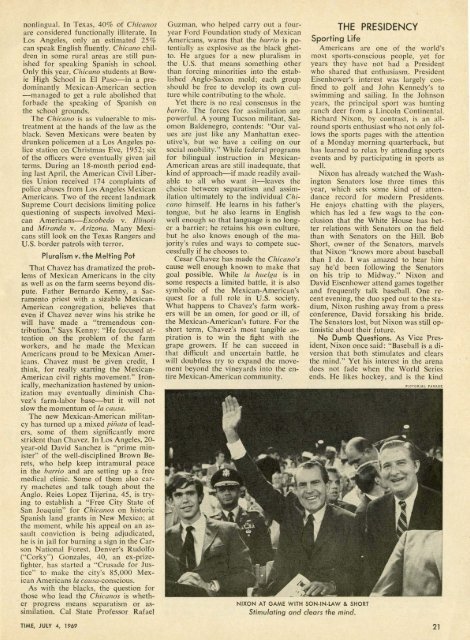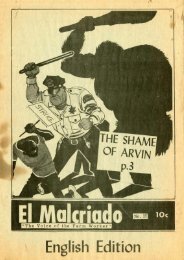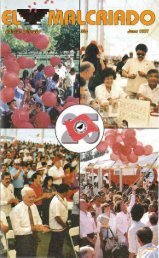You also want an ePaper? Increase the reach of your titles
YUMPU automatically turns print PDFs into web optimized ePapers that Google loves.
nonlingual. In Texas, 40% of Chicanosare considered functionally illiterate. InLos Angeles, only an estimated 25%can speak English fluently. Chicano childrenin some rural areas are still punishedfor speaking Spanish in school.Only this year, Chicano students at BowieHigh School in El Paso-in a predominantlyMexican-American section-managed <strong>to</strong> get a rule abolished <strong>that</strong>forbade <strong>the</strong> speaking of Spanish on<strong>the</strong> school grounds.The Chicano is as vulnerable <strong>to</strong> mistreatmentat <strong>the</strong> hands of <strong>the</strong> <strong>la</strong>w as <strong>the</strong>b<strong>la</strong>ck. Seven Mexicans were beaten bydrunken policemen at a Los Angeles policestation on Christmas Eve, 1952; sixof <strong>the</strong> officers were eventually given jailterms. During an 18-month period ending<strong>la</strong>st April, <strong>the</strong> American Civil LibertiesUnion received 174 comp<strong>la</strong>ints ofpolice abuses from Los Angeles MexicanAmericans. Two of <strong>the</strong> recent <strong>la</strong>ndmarkSupreme Court decisions limiting policequestioning of suspects involved MexicanAmericans-Escobedo v. Illinoisand Miranda v. Arizona. Many Mexicansstill look on <strong>the</strong> Texas Rangers andU.S. border patrols with terror.Pluralism v. <strong>the</strong> Melting PotThat Chavez has dramatized <strong>the</strong> problemsof Mexican Americans in <strong>the</strong> cityas well as on <strong>the</strong> farm seems beyond dispute.Fa<strong>the</strong>r Bernardo Kenny, a Sacramen<strong>to</strong>priest with a sizable MexicanAmerican congregation, believes <strong>that</strong>even if Chavez never wins his <strong>strike</strong> hewill have made a "tremendous contribution."Says Kenny: "He focused attentionon <strong>the</strong> problem of <strong>the</strong> farmworkers, and he made <strong>the</strong> MexicanAmericans proud <strong>to</strong> be Mexican Americans.Chavez must be given credit, Ithink, for really starting <strong>the</strong> MexicanAmerican civil rights movement." Ironically,mechanization hastened by unionizationmay eventually diminish Chavez'sfarm-<strong>la</strong>bor base-but it will notslow <strong>the</strong> momentum of <strong>la</strong> <strong>causa</strong>.The new Mexican-American militancyhas turned up a mixed pinata of leaders,some of <strong>the</strong>m significantly morestrident than Chavez. In Los Angeles, 20year-old David Sanchez is "prime minister"of <strong>the</strong> well-disciplined Brown Berets,who help keep intramural peacein <strong>the</strong> barrio and are setting up a freemedical clinic. Some of <strong>the</strong>m also carrymachetes and talk <strong>to</strong>ugh about <strong>the</strong>Anglo. Reies Lopez Tijerina, 45, is trying<strong>to</strong> establish a "Free City State ofSan Joaquin" for Chicanos on his<strong>to</strong>ricSpanish <strong>la</strong>nd grants in New Mexico; at<strong>the</strong> moment, while his appeal on an assaultconviction is being adjudicated,he is in jail for burning a sign in <strong>the</strong> CarsonNational Forest. Denver's Rudolfo("Corky") Gonzales, 40, an ex-prizefighter,has started a "Crusade for Justice"<strong>to</strong> make <strong>the</strong> city's 85,000 MexicanAmericans <strong>la</strong> <strong>causa</strong>-conscious.As with <strong>the</strong> b<strong>la</strong>cks, <strong>the</strong> question forthose who lead <strong>the</strong> Chicanos is whe<strong>the</strong>rprogress means separatism or assimi<strong>la</strong>tion.Cal State Professor RafaelGuzman, who helped carry out a fouryearFord Foundation study of MexicanAmericans, warns <strong>that</strong> <strong>the</strong> barrio is potentiallyas explosive as <strong>the</strong> b<strong>la</strong>ck ghet<strong>to</strong>.He argues for a new pluralism in<strong>the</strong> U.S. <strong>that</strong> means something o<strong>the</strong>rthan forcing minorities in<strong>to</strong> <strong>the</strong> establishedAnglo-Saxon mold; each groupshould be free <strong>to</strong> develop its own culturewhile contributing <strong>to</strong> <strong>the</strong> whole.Yet <strong>the</strong>re is no real consensus in <strong>the</strong>barrio. The forces for assimi<strong>la</strong>tion arepowerful. A young Tucson militant, SalomonBaldenegro, contends: "Our valuesare just like any Manhattan executive's,but we have a ceiling on oursocial mobility." While federal programsfor bilingual instruction in MexicanAmerican areas are still inadequate, <strong>that</strong>kind of approach-if made readily avai<strong>la</strong>ble<strong>to</strong> all who want it-leaves <strong>the</strong>choice between separatism and assimi<strong>la</strong>tionultimately <strong>to</strong> <strong>the</strong> individual Chicanohimself. He learns in his fa<strong>the</strong>r's<strong>to</strong>ngue, but he also learns in Englishwell enough so <strong>that</strong> <strong>la</strong>nguage is no longera barrier; he retains his own culture,but he also knows enough of <strong>the</strong> majority'srules and ways <strong>to</strong> compete successfullyif he chooses <strong>to</strong>.Cesar Chavez has made <strong>the</strong> Chicano'scause well enough known <strong>to</strong> make <strong>that</strong>goal possible. While La hueLga is insome respects a limited battle, it is alsosymbolic of <strong>the</strong> Mexican-American'squest for a full role in U.S. society.What happens <strong>to</strong> Chavez's farm workerswill be an omen, for good or ill, of<strong>the</strong> Mexican-American's future. For <strong>the</strong>short term, Chavez's most tangible aspirationis <strong>to</strong> win <strong>the</strong> fight with <strong>the</strong>grape growers. If he can succeed in<strong>that</strong> difficult and uncertain battle, hewill doubtless try <strong>to</strong> expand <strong>the</strong> movementbeyond <strong>the</strong> vineyards in<strong>to</strong> <strong>the</strong> entireMexican-American community.THENiXON AT GAME WITH SON·iN·LAW & SHORTStimu<strong>la</strong>ting and clears <strong>the</strong> mind.PRESIDENCYSporting LifeAmericans are one of <strong>the</strong> world'smost sports-conscious people, yet foryears <strong>the</strong>y have not had a Presidentwho shared <strong>that</strong> enthusiasm. PresidentEisenhower's interest was <strong>la</strong>rgely confined<strong>to</strong> golf and John Kennedy's <strong>to</strong>swimming and sailing. In <strong>the</strong> Johnsonyears, <strong>the</strong> principal sport was huntingranch deer from a Lincoln Continental.Richard Nixon, by contrast, is an allroundsports enthusiast who not only follows<strong>the</strong> sports pages with <strong>the</strong> attentionof a Monday morning quarterback, buthas learned <strong>to</strong> re<strong>la</strong>x by attending sportsevents and by participating in sports aswell.Nixon has already watched <strong>the</strong> Washing<strong>to</strong>nSena<strong>to</strong>rs lose three times thisyear, which sets some kind of attendancerecord for modern Presidents.He enjoys chatting with <strong>the</strong> p<strong>la</strong>yers,which has led a few wags <strong>to</strong> <strong>the</strong> conclusion<strong>that</strong> <strong>the</strong> White House has betterre<strong>la</strong>tions with Sena<strong>to</strong>rs on <strong>the</strong> fieldthan with Sena<strong>to</strong>rs on <strong>the</strong> Hill. BobShort, owner of <strong>the</strong> Sena<strong>to</strong>rs, marvels<strong>that</strong> Nixon "knows more about baseballthan I do. I was amazed <strong>to</strong> hear himsay he'd been following <strong>the</strong> Sena<strong>to</strong>rson his trip <strong>to</strong> Midway." Nixon andDavid Eisenhower attend games <strong>to</strong>ge<strong>the</strong>rand frequently talk baseball. One recentevening, <strong>the</strong> duo sped out <strong>to</strong> <strong>the</strong> stadium,Nixon rushing away from a pressconference, David forsaking his bride.The Sena<strong>to</strong>rs lost, but Nixon was still optimisticabout <strong>the</strong>ir future.No Dumb Questions. As Vice President,Nixon once said: "Baseball is a diversion<strong>that</strong> both stimu<strong>la</strong>tes and clears<strong>the</strong> mind." Yet his interest in <strong>the</strong> arenadoes not fade when <strong>the</strong> World Seriesends. He likes hockey, and is <strong>the</strong> kindPICTOR IAL PARADETIME, JULY 4, 1969 21





